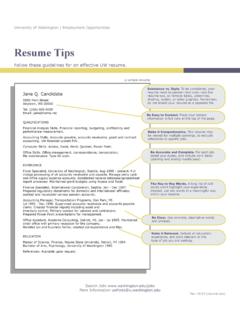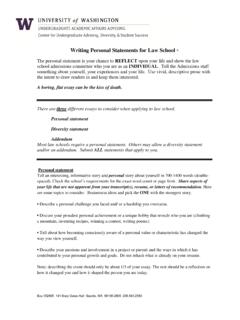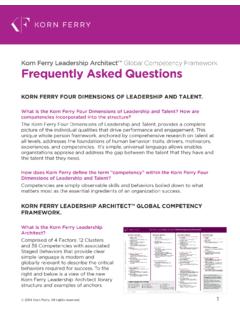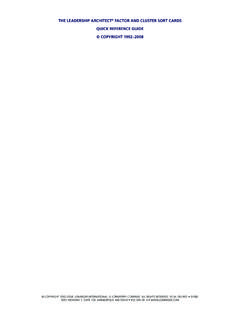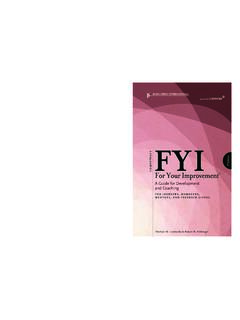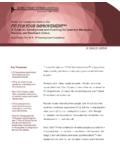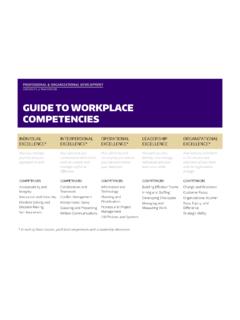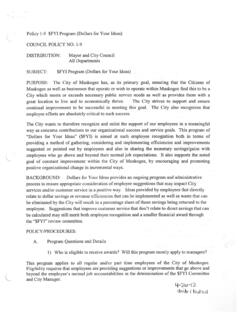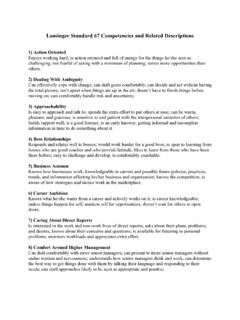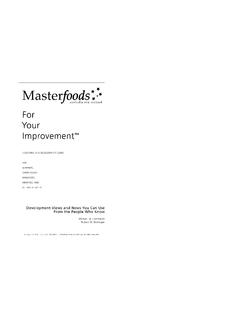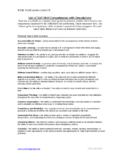Transcription of GUIDE TO WORKPLACE COMPETENCIES - washington.edu
1 GUIDE TO WORKPLACE COMPETENCIES INDIVIDUAL EXCELLENCE* INTERPERSONAL EXCELLENCE* OPERATIONAL EXCELLENCE* LEADERSHIP EXCELLENCE ORGANIZATIONAL EXCELLENCE* How you manage yourself and your approach to work How effectively you communicate with others, work on a team, and manage conflict or difference How efficiently and successfully you execute your job and achieve your objectives How well you hire, develop, and manage individuals and your team as a whole How well you contribute to the mission and objectives of your team and the organization at large COMPETENCIES Accountability and Integrity Innovation and Creativity Problem Solving and Decision Making Self-Awareness COMPETENCIES Collaboration and Teamwork Conflict Management Interpersonal Savvy Speaking and Presenting Written Communications COMPETENCIES Information and Technology Planning and Prioritization Process and Project Management UW Policies and Systems COMPETENCIES Building Effective Teams Hiring and Staffing Developing Employees Managing and Measuring Work COMPETENCIES Change and Resilience Customer Focus Organizational Acumen Race, Equity, and Difference Strategic Ability * In each of these clusters, you ll find COMPETENCIES with a leadership dimension.
2 University of washington Professional & Organizational Development UPDATED MAY 2018 POD GUIDE TO WORKPLACE COMPETENCIES INDIVIDUAL EXCELLENCE .. 3 Accountability and Integrity .. 3 Innovation and Creativity .. 4 Problem Solving and Decision Making .. 5 Self-Awareness .. 6 INTERPERSONAL EXCELLENCE .. 7 Collaboration and Teamwork .. 7 Conflict Management .. 8 Interpersonal Savvy .. 9 Speaking and Presenting .. 10 Written Communications .. 11 OPERATIONAL EXCELLENCE .. 12 Information and Technology .. 12 Planning and Prioritization .. 13 Process and Project Management .. 14 UW Policies and Systems .. 15 LEADERSHIP EXCELLENCE .. 16 Building Effective Teams .. 16 Hiring and Staffing .. 17 Developing Employees .. 18 Managing and Measuring Work .. 19 ORGANIZATIONAL EXCELLENCE .. 20 Change and Resilience .. 20 Customer Focus .. 21 Organizational Acumen.
3 22 Race, Equity, and Difference .. 23 Strategic Ability .. 24 DIRECTLY SUPPORTS DEVELOPING THIS COMPETENCY. MAY HELP DEVELOP ASPECTS OF THIS COMPETENCY. COMPETENCIES adapted from FYI: for your improvement by Michael M. Lombardo and Robert W. Eichinger (2009). PAGE 3 INDIVIDUAL EXCELLENCE Accountability and Integrity A. Accepts responsibility for mistakes. B. Actively seeks and accepts feedback. C. Demonstrates an understanding of impact on others. D. Holds self accountable for delivering on commitments and renegotiates when needed and appropriate. E. Is perceived as a direct, truthful individual, and is widely trusted. Leadership Dimension: F. Demonstrates a high level of integrity. G. Displays managerial courage (confronts others, makes difficult decisions, etc.). H. Does what she/he says; "walks the talk." I. Holds others accountable for making and delivering on commitments and renegotiates when needed and appropriate.
4 J. Models the values of the organization. RELATED POD OFFERINGS Classes and webinars Q0850 How to Give and Receive Feedback SLP210 SLP Level 2: Core Strengths Accountability Q1220 Conflict Management Q0220 Customer Service Excellence Q0000 Developing Assertiveness Skills Q0720 Learned Optimism: Understanding your Explanatory Style Q1420 The Likeability Factor Q1210 Motivating Employees SLP220 SLP Level 2: Leadership Advantage Consulting services Coaching services UW ARC 360 (360-degree assessment) Training programs SLP Supervisor Orientation UW Human Resources training Prevention of Sexual Harassment Orientation Violence Prevention and Response Training DIRECTLY SUPPORTS DEVELOPING THIS COMPETENCY. MAY HELP DEVELOP ASPECTS OF THIS COMPETENCY. COMPETENCIES adapted from FYI: for your improvement by Michael M. Lombardo and Robert W.
5 Eichinger (2009). PAGE 4 Innovation and Creativity A. Generates new and unique ideas and solutions. B. Easily makes connections among previously unrelated notions. C. Demonstrates innovative and creative thinking processes. D. Seen as original and value-added in brainstorming sessions. Leadership Dimension: E. Effectively adjusts to situations that need rapid resolution. F. Fosters an attitude of continuous improvement . G. Seeks and incorporates feedback from customers/other organizations about the performance of their unit. H. Seeks out and is open to innovative ways to achieve results. RELATED POD OFFERINGS Classes and webinars Q1550 Mindfulness and Leadership Q1460 Thinking on your Feet Q1520 Understand and Influence your Work Culture Q1600 Courageous Collaboration Q1160 Master Process Planning Q1570 Own your Brand Q1170 Process improvement Tools Q1180 Rapid Process improvement SLP220 SLP Level 2: Leadership Advantage DIRECTLY SUPPORTS DEVELOPING THIS COMPETENCY.
6 MAY HELP DEVELOP ASPECTS OF THIS COMPETENCY. COMPETENCIES adapted from FYI: for your improvement by Michael M. Lombardo and Robert W. Eichinger (2009). PAGE 5 Problem Solving and Decision Making A. Makes timely and sound decisions that lead to results. B. Looks beyond the obvious to perform honest analysis and see hidden problems. C. Uses rigorous logic and methods to solve difficult problems with effective solutions. Leadership Dimension: D. Considers a broad range of issues or factors in making decisions. E. Effectively balances tasks and people the need for work to get done and concern for people s needs. F. Pushes decision-making to the lowest-appropriate level. G. Sees the complexities of and relationships among problems or issues. RELATED POD OFFERINGS Certificates Administrative Excellence Classes and webinars Q1410 Directing and Delegating Work Q0720 Learned Optimism: Understanding your Explanatory Style Q1580 Negotiating Effectively Q1170 Process improvement Tools Q1180 Rapid Process improvement SLP220 SLP Level 2: Leadership Advantage Q1470 Working Smarter Consulting services Coaching services DIRECTLY SUPPORTS DEVELOPING THIS COMPETENCY.
7 MAY HELP DEVELOP ASPECTS OF THIS COMPETENCY. COMPETENCIES adapted from FYI: for your improvement by Michael M. Lombardo and Robert W. Eichinger (2009). PAGE 6 Self-Awareness A. Is committed to and actively works to improve self. B. Knows personal strengths, weaknesses, opportunities, and limits. C. Seeks feedback regularly and from multiple sources. D. Gains insights from mistakes. E. Is open to criticism; isn t defensive. F. Looks forward to balanced performance reviews and career discussions. RELATED POD OFFERINGS Classes and webinars Q1480 Acing the Marshmallow Test Q0910 Discovering your Dependable Strengths Q0110 Emotional Intelligence Q0850 How to Give and Receive Feedback Q0720 Learned Optimism: Understanding your Explanatory Style Q1420 The Likeability Factor Q0060 Turning Negative Emotions Into Positive Outcomes Q0030 Communication Style: Creating Positive Relationships and Results Q0040 Communications Q1220 Conflict Management Q0300 Conflict Resolution Skills for Health Care Professionals Q0220 Customer Service Excellence Q1200 Cultivating Cultural Competence Q0000 Developing Assertiveness Skills Q0200 Learning to Lead Q0430 Managing Stress Q1550 Mindfulness and Leadership Q1590 People From Pluto: Effective Communication Strategies SLP210 SLP Level 2.
8 Core Strengths Accountability SLP220 SLP Level 2: Leadership Advantage Q1470 Working Smarter Consulting services Myers-Briggs Type Indicator (assessment and follow-up coaching) UW ARC 360 (360-degree assessment) Coaching services DIRECTLY SUPPORTS DEVELOPING THIS COMPETENCY. MAY HELP DEVELOP ASPECTS OF THIS COMPETENCY. COMPETENCIES adapted from FYI: for your improvement by Michael M. Lombardo and Robert W. Eichinger (2009). PAGE 7 INTERPERSONAL EXCELLENCE Collaboration and Teamwork A. Achieves results through collaboration. B. Establishes common ground and connections with others. C. Collaborates well with people different from self. D. Shows an interest in and acknowledges others input and skills. Leadership Dimension: E. Builds appropriate alliances across organizational lines. F. Contributes to discussions, actions, and projects in ways that lead to shared responsibility and shared success.
9 G. Motivates and challenges others to define new opportunities and continuously improve the organization. H. Shares ownership, visibility, and credit for success. RELATED POD OFFERINGS Certificates Administrative Excellence Classes and webinars Q1440 Building Better Teams Q1600 Courageous Collaboration Q1240 Increasing your Influence Q1590 People From Pluto: Effective Communication Strategies Q0260 Building a Positive Work Culture Q0030 Communication Style: Creating Positive Relationships and Results Q0040 Communications Q0000 Developing Assertiveness Skills QW025 Google Docs & Drive Beginner Q0640 Leadership Style Makes a Difference Q0200 Learning to Lead Q1420 The Likeability Factor Q0170 Making the Move From Peer to Supervisor QW004 Microsoft Excel Techniques Q1210 Motivating Employees Q1580 Negotiating Effectively Q0460 Project Management Essentials Q1350 Project Management for the Non-Project Manager SLP210 SLP Level 2.
10 Core Strengths Accountability SLP220 SLP Level 2: Leadership Advantage Q0331 Training, Coaching, and Mentoring for Success Q0730 Working Across Generations Consulting services Myers-Briggs Type Indicator (assessment and follow-up coaching) Team building consultation and related services Coaching services DIRECTLY SUPPORTS DEVELOPING THIS COMPETENCY. MAY HELP DEVELOP ASPECTS OF THIS COMPETENCY. COMPETENCIES adapted from FYI: for your improvement by Michael M. Lombardo and Robert W. Eichinger (2009). PAGE 8 Conflict Management A. Deals with rather than avoids conflict. B. Diffuses high-tension situations comfortably. C. Finds common ground and solves problems for the good of all. D. Good at focused listening; has the patience to hear people out. E. Maintains composure and positive outlook during times of disagreement. F. Represents own interests and is fair to others.
